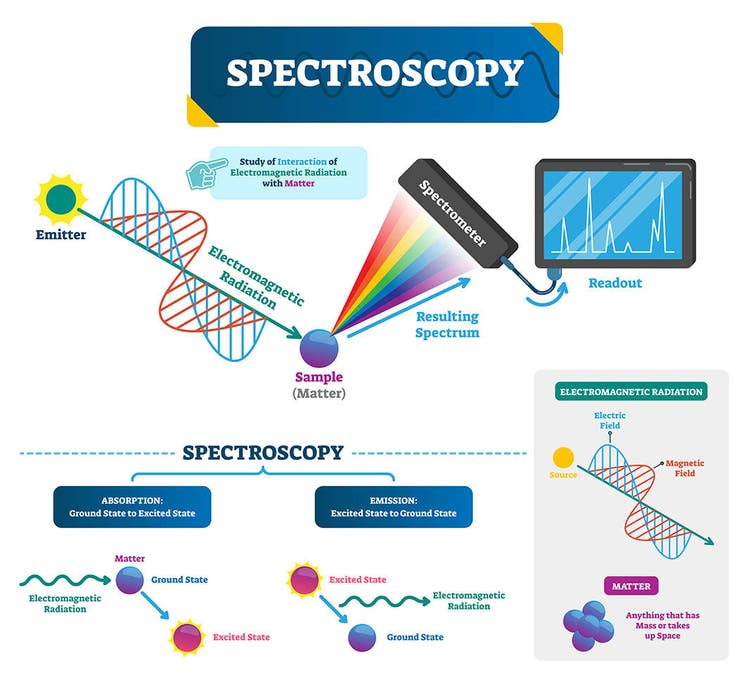Spectroscopy Assignment Help
April 23, 2024 2025-01-17 10:10Spectroscopy Assignment Help
Spectroscopy Assignment Help
Exploring the World of Spectroscopy with Tutor Intellect
Spectroscopy is a branch of chemistry that studies and interprets the electromagnetic spectrum. Its importance lies in analytical and physical chemistry, where the data is used to unravel the structural composition and quantity of the substance. While tremendously interesting, the subject can be equally tough to comprehend. As a result, several students studying the subject seek professional spectroscopy assignment help or personalised tutoring to help them master the subject. Tutor Intellect is the perfect platform to guide students on the path of Spectroscopy.
What is Spectroscopy?
Spectroscopy is the science of studying the interaction between matter and electromagnetic radiation. It provides a powerful tool for analysing substances’ composition, structure, and properties. The absorption and emission spectra of light scattering can be quantified by spectroscopic analysis. This enables scientists to unravel the molecular fingerprints that define any material’s chemical and physical characteristics. These topics can be very difficult to understand and may require several lectures. However, while that is impossible with your regular classes, Tutor Intellect can help you with Online Spectroscopy Tutoring. Our spectroscopy assignment experts help you delve into the intricacies of spectroscopy, offering insights and assistance to navigate this important technique.
World's Best Assignment Help Services
What is the Importance of Spectroscopy in Chemistry?
Spectroscopy is an important cornerstone of chemistry as it plays a pivotal role in various branches, from organic and inorganic chemistry to biochemistry. Spectroscopic methods, such as infrared spectroscopy and nuclear magnetic resonance (NMR), are instrumental in identifying compounds, elucidating molecular structures, and probing the dynamics of chemical reactions. The ability to interpret spectral data is an invaluable skill for researchers, making spectroscopy indispensable for advancing scientific knowledge and technological innovation. Students who can master the technique can be assured of a bright future. Our spectroscopy assignment help tutors are available 24/7 to help you understand the interpretation of complex IR, NMR, C-NMR and Mass Spectras.
Applications of Spectroscopy:
- Chemical Analysis: Identifying and quantifying chemical compounds in mixtures.
- Material Science: Characterizing the properties and structures of new materials.
- Environmental Monitoring: Detecting pollutants and analyzing environmental samples.
- Medical Diagnostics: Identifying biomarkers and studying metabolic processes.
- Astronomy: Analyzing the composition and properties of celestial bodies.
- Pharmaceuticals: Ensuring the purity and composition of drugs and formulations.
Why do Students Need Assistance for Spectroscopy?
Although tremendously interesting and exciting, spectroscopy can be challenging for students. This is primarily because of its interdisciplinary nature, which requires a solid understanding of physics and chemistry. Interpreting complex spectra and grasping the underlying principles of different spectroscopic techniques require dedicated attention and guidance. Students often require assistance while mastering spectroscopy and Tutor Intellect provides specialised assistance for Spectroscopy Homework Help. Whether understanding peaks in an infrared spectrum or interpreting NMR signals, our experienced tutors assist students through the intricacies for their improved academic growth.


Why Choose Tutor Intellect for Spectroscopy Assignment & Homework Help?
Tutor Intellect is one platform that guides students in navigating the intricate world of spectroscopy. Our comprehensive team of expert tutors brings the best academic excellence with practical experience in spectroscopic techniques, making them perfect for Spectroscopy Assignment Help. If you are struggling with any spectroscopy topic, you can choose Tutor Intellect, as we provide:
Comprehensive Learning: Spectroscopy involves various topics ranging from UV-visible spectroscopy to mass spectrometry. Our team of experts are well versed in the various spectroscopic techniques and ensures that they share that knowledge with you.
Customised Solutions: Plagiarism is a common issue plaguing the education industry. When students approach us for Spectroscopy Assignment Help, we ensure they get tailored solutions instead of generalised ones. This ensures they do not lose grades due to similar assignments.
If you look forward to elevating your Spectroscopy journey, trust Tutor Intellect to be your study partner. We offer comprehensive knowledge with expert guidance to make things easier to understand.
Key Topics of Spectroscopy for Homework and Assignment Help:
Introduction to Spectroscopy
- Basics of spectroscopy and its applications.
- Types of spectroscopy (UV-Vis, IR, NMR, etc.).
- The interaction of light with matter.
UV-Visible Spectroscopy
- Principles of UV-Vis spectroscopy.
- Beer-Lambert law and its applications.
- Absorption spectra of organic and inorganic compounds.
- Applications in determining concentrations and molecular structures.
Infrared (IR) Spectroscopy
- Vibrational transitions and molecular vibrations.
- Functional group identification using IR spectra.
- Interpretation of IR spectra.
- Applications in organic chemistry and material identification.
Nuclear Magnetic Resonance (NMR) Spectroscopy
- Principles of NMR spectroscopy and magnetic fields.
- Proton NMR (1H NMR) and Carbon-13 NMR (13C NMR).
- Chemical shifts, splitting patterns (coupling), and integration.
- Applications in structural analysis of organic molecules.
Mass Spectrometry (MS)
- Principles of mass spectrometry.
- Ionization techniques (Electron impact, MALDI, ESI).
- Mass-to-charge ratio (m/z) and fragmentation patterns.
- Applications in determining molecular weights and structures.
Fluorescence Spectroscopy
- The principles of fluorescence and phosphorescence.
- Quantum yield and Stokes shift.
- Fluorescence spectroscopy in biological and chemical analysis.
- Applications in environmental science and medical diagnostics.
Atomic Absorption Spectroscopy (AAS)
- Principles of atomic absorption and flame analysis.
- Determination of metals and their concentrations.
- Applications in environmental and industrial analysis.
Raman Spectroscopy
- Principles of Raman scattering and shift.
- Raman vs. IR spectroscopy.
- Applications in chemical identification and structural analysis.
X-ray Crystallography
- Principles and techniques of X-ray diffraction.
- Determining the 3D structure of molecules, especially large biological molecules.
- Applications in solid-state chemistry and material science.
Spectroscopic Instrumentation
- Components of spectrometers (light sources, detectors, and sample holders).
- Calibration of spectroscopic instruments.
- Development and improvements in spectroscopy technologies.
Quantum Theory in Spectroscopy
- Understanding the interaction between light and matter at the quantum level.
- Energy quantization and transitions.
- Applications of quantum mechanics in explaining spectral lines and shifts.
Applications of Spectroscopy
- Use in pharmaceuticals for drug analysis and quality control.
- Environmental monitoring (e.g., air, water quality analysis).
- Forensic science for identifying substances.
- Biochemical applications (protein, enzyme activity studies).
- Material science for characterization of solid materials.
Interpretation of Spectral Data
- Identifying compounds and functional groups from spectra.
- Comparing spectra for structural elucidation.
- Integration of multi-technique data for comprehensive analysis.
Advanced Spectroscopic Techniques
- Two-dimensional NMR spectroscopy.
- Synchrotron-based spectroscopy.
- Time-resolved spectroscopy for dynamic studies.
FAQs Related to Spectroscopy Homework and Assignment Help Service:
1. What is Spectroscopy, and why is it important in scientific studies?
Spectroscopy is the study of how light interacts with matter. It is important because it helps scientists identify the composition and structure of materials, providing valuable insights in fields like chemistry, physics, biology, and environmental science.
2. What are the different types of spectroscopy techniques used in assignments?
Common types of spectroscopy include:
- UV-Vis Spectroscopy
- Infrared (IR) Spectroscopy
- Nuclear Magnetic Resonance (NMR) Spectroscopy
- Mass Spectrometry (MS)
- Fluorescence Spectroscopy
Each technique has its own unique applications for analyzing different types of samples.
3. How can spectroscopy assignments be challenging for students?
Spectroscopy assignments can be challenging because they require an understanding of complex mathematical principles, experimental procedures, and interpretation of spectra. Students often find it difficult to analyze data and draw accurate conclusions, which is why expert assistance is helpful.
4. What topics can I get help with in Spectroscopy?
We offer expert help with a wide range of topics in spectroscopy, including:
- Spectral data interpretation
- Spectroscopy principles and techniques
- Peak identification in spectra
- Quantitative analysis using spectroscopy
- Instrumentation and calibration in spectroscopy
- Applications in organic and inorganic chemistry
5. Why is NMR spectroscopy important in chemistry assignments?
Nuclear Magnetic Resonance (NMR) Spectroscopy plays a key role in identifying the structure of organic compounds. It helps students determine the connectivity of atoms within a molecule, which is essential for solving complex organic chemistry problems.
6. How do I submit my Spectroscopy assignment for help?
You can submit your spectroscopy assignment by filling out our online form with details about your project or by sending us an email. Once we receive your submission, we will assign the best expert to assist you promptly.
7. What makes your Spectroscopy assignment help different from others?
Our spectroscopy experts have years of academic and professional experience. We offer:
- 24/7 availability
- Plagiarism-free work
- Detailed step-by-step guidance
- Timely delivery
- Affordable rates
8. How do I interpret a spectroscopy spectrum for my assignment?
Interpreting spectroscopy spectra involves analyzing peaks, understanding the relationship between frequency and energy levels, and applying knowledge of chemical shifts, functional groups, and bond types. Our team can guide you through the process for any spectra interpretation challenge.
9. Do you offer tutoring for Spectroscopy in addition to assignments?
Yes, we offer personalized tutoring sessions for students who want to strengthen their understanding of spectroscopy. Our tutors can help with both theory and practice problems
10. What are the benefits of using your Spectroscopy assignment help services?
By choosing our services, students can:
- Gain deeper insights into complex spectroscopy topics
- Save time by getting expert solutions
- Improve academic performance
- Receive assistance from qualified professionals with a strong understanding of spectroscopy.


